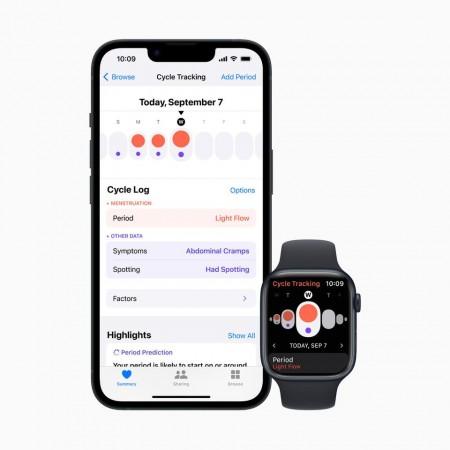Ahead of International Women's Day 2023, Apple shows its commitment to women's health through its products and services. The iPhone maker has shared new preliminary findings from the Apple Women's Health Study, which emphasizes the importance of paying attention to menstrual cycles and their connection to overall health. The theme for this year's IWD is "DigitALL: Innovation and technology for gender equality" and it is fitting to see Apple's participation in an effective manner.
The health study commissioned by Apple is a first of its kind, conducted with the Harvard T.H. Chan School of Public Health and the National Institute of Environmental Health Sciences (NIEHS). The purpose of the study was to understand menstrual cycles and how they relate to various health conditions such as polycystic ovary syndrome (PCOS), infertility, and the menopausal transition. The findings shared by Apple are a preliminary analysis cohort of over 50,000 study participants.

"More awareness on menstrual cycle physiology and the impact of irregular periods and PCOS on uterine health is needed. This analysis highlights the importance of talking to a healthcare provider when menstruators are experiencing persistent changes to their period that span many months. Over time, we hope our research can lead to new strategies to reduce disease risk and improve health across the lifespan," said Dr. Shruthi Mahalingaiah, MS, Harvard Chan School's assistant professor of Environmental Reproductive and Women's Health and co-principal investigator of the Apple Women's Health Study.
The study team has found:
- 12 percent of participants reported a PCOS diagnosis. Participants with PCOS had more than four times the risk of endometrial hyperplasia (precancer of the uterus) and more than 2.5 times the risk of uterine cancer.
- 5.7 percent of participants reported their cycles taking five or more years to reach cycle regularity after their first period. Participants in that group had more than twice the risk of endometrial hyperplasia and more than 3.5 times the risk of uterine cancer, compared to those who reported their cycles took less than one year to reach regularity.
Apple goes beyond research; gives actionable insights
Over the years, Apple has introduced a wide array of innovative health and fitness features, which give users a better understanding of one's health with easy-to-understand, meaningful insights. With the iOS 16 and watchOS 9, Apple introduced advanced health features, which focus on heart health, sleep, mobility and women's health.

Stories of Apple Watch saving lives by detecting cardiac irregularities early are plenty. But Apple's health focus runs beyond heart health and is frankly much underreported. For instance, Apple Watch Series 8 is able to track your temperature while you sleep so you can see changes from your baseline and Cycle Tracking uses this data to provide a retrospective estimate of when you likely ovulated, which can be helpful for family planning.

Cycle Tracking users will be notified if there's a pattern of irregular periods, infrequent periods, prolonged periods, or persistent spotting. It's important to know when these patterns occur, as they may be a sign of an underlying health condition such as fibroids, polycystic ovarian syndrome, or thyroid disorders. You can access all of the cycle history and share it as a PDF with your healthcare provider if you notice irregularities.

The Cycle Tracking feature is one of many health features your iPhone and Apple Watch have. The Watch Series 8 has Blood Oxygen sensor, ECG, Fall Detection, Heart rate and sleep tracking. Since Apple is dealing with critical information involving an individual's health, there's no compromise on privacy. All of the health and fitness data tracked by your Apple Watch is securely stored in a locked iPhone in an encrypted format. Even the health app data synced to iCloud is encrypted end-to-end, which should put privacy advocates' minds at ease.









!['Had denied Housefull franchise as they wanted me to wear a bikini': Tia Bajpai on turning down bold scripts [Exclusive]](https://data1.ibtimes.co.in/en/full/806605/had-denied-housefull-franchise-they-wanted-me-wear-bikini-tia-bajpai-turning-down-bold.png?w=220&h=138)



